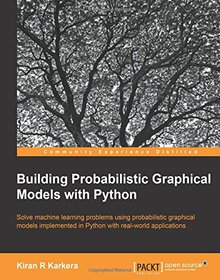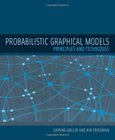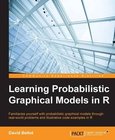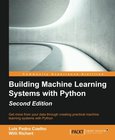Building Probabilistic Graphical Models with Python

Book Details:
| Publisher: | Packt Publishing |
| Series: | Packt |
| Author: | Kiran R Karkera |
| Edition: | 1 |
| ISBN-10: | 1783289007 |
| ISBN-13: | 9781783289004 |
| Pages: | 172 |
| Published: | Jun 25 2014 |
| Posted: | Nov 19 2014 |
| Language: | English |
| Book format: | |
| Book size: | 4.31 MB |
Book Description:
Solve machine learning problems using probabilistic graphical models implemented in Python with real-world applications Overview Stretch the limits of machine learning by learning how graphical models provide an insight on particular problems, especially in high dimension areas such as image processing and NLP Solve real-world problems using Python libraries to run inferences using graphical models A practical, step-by-step guide that introduces readers to representation, inference, and learning using Python libraries best suited to each task In Detail With the increasing prominence in machine learning and data science applications, probabilistic graphical models are a new tool that machine learning users can use to discover and analyze structures in complex problems. The variety of tools and algorithms under the PGM framework extend to many domains such as natural language processing, speech processing, image processing, and disease diagnosis. You've probably heard of graphical models before, and you're keen to try out new landscapes in the machine learning area. This book gives you enough background information to get started on graphical models, while keeping the math to a minimum. What you will learn from this book Create Bayesian networks and make inferences Learn the structure of causal Bayesian networks from data Gain an insight on algorithms that run inference Explore parameter estimation in Bayes nets with PyMC sampling Understand the complexity of running inference algorithms in Bayes networks Discover why graphical models can trump powerful classifiers in certain problems Approach This is a short, practical guide that allows data scientists to understand the concepts of Graphical models and enables them to try them out using small Python code snippets, without being too mathematically complicated. Who this book is written for If you are a data scientist who knows about machine learning and want to enhance your knowledge of graphical models, such as Bayes network, in order to use them to solve real-world problems using Python libraries, this book is for you. This book is intended for those who have some Python and machine learning experience, or are exploring the machine learning field.
Download Link:
Related Books:
Probabilistic Graphical Models
Principles and Techniques
Most tasks require a person or an automated system to reason -- to reach conclusions based on available information. The framework of probabilistic graphical models, presented in this book, provides a general approach for this task. The approach is model-based, allowing interpretable models to be constructed and then manipulated by reasoning algorithms. These models can also be learned automatically from data, allowing the approach to be used in cases where manually constructing a model is difficult or even impossible. Because uncertainty is an inescapable aspect of most real-world applications, the book focuses on probabilistic models, which make the uncertainty explicit and provide models that are more faithful to reality. Probabilistic Graphical M...
Learning Probabilistic Graphical Models in R
Familiarize yourself with probabilistic graphical models through real-world problems and illustrative code examples in R About This Book * Predict and use a probabilistic graphical models (PGM) as an expert system * Comprehend how your computer can learn Bayesian modeling to solve real-world problems * Know how to prepare data and feed the models by using the appropriate algorithms from the appropriate R package Who This Book Is For This book is for anyone who has to deal with lots of data and draw conclusions from it, especially when the data is noisy or uncertain. Data scientists, machine learning enthusiasts, engineers, and those who curious about the latest advances in machine learning will find PGM interesting. What You Will Learn * Underst...
2007 - 2021 © eBooks-IT.org



